
Toxicology Research
Scope & Guideline
Fostering interdisciplinary collaboration for a healthier world.
Introduction
Aims and Scopes
- Chemical Toxicology:
Research focusing on the mechanisms by which various chemicals, including drugs, industrial chemicals, and environmental pollutants, induce toxic effects at cellular and molecular levels. - Environmental Toxicology:
Studies examining the impact of environmental contaminants, such as heavy metals, microplastics, and pesticides, on ecosystems and human health. - Pharmacological Interventions:
Investigations into the protective effects of natural and synthetic compounds against toxic exposures, including the development of novel therapeutic strategies. - Risk Assessment and Epidemiology:
Research aimed at assessing the risks associated with chemical exposures, including epidemiological studies that evaluate the health impacts of toxicants in human populations. - Experimental Models in Toxicology:
Utilization of in vitro and in vivo models to study toxicological responses and mechanisms, including the use of advanced techniques such as molecular biology and bioinformatics. - Nanotoxicology:
Exploration of the toxicological effects of nanomaterials and their interactions with biological systems, focusing on both therapeutic and environmental implications.
Trending and Emerging
- Integrative Approaches in Toxicology:
There is an increasing trend towards integrative toxicology, where studies combine molecular, cellular, and ecological perspectives to understand the complex interactions between toxicants and biological systems. - Personalized Toxicology:
Emerging research is focusing on the variability in toxic responses among individuals, driven by genetic, epigenetic, and environmental factors, leading to personalized approaches in risk assessment and therapeutic interventions. - Microbiome and Toxicology:
Increasing recognition of the role of the microbiome in modulating toxicological outcomes has led to a surge in research exploring how gut microbiota influence the metabolism and toxicity of various compounds. - Nano- and Biotechnological Applications:
Research into the toxicological implications of nanotechnology and biotechnological applications is on the rise, particularly regarding their potential risks and benefits in both therapeutic and environmental contexts. - Environmental Health and Climate Change:
Emerging studies are increasingly addressing the intersection of toxicology with climate change, highlighting the health impacts of environmental changes and exposure to new toxicants resulting from such changes.
Declining or Waning
- Traditional Chemical Toxicology:
Research that primarily focused on the toxic effects of well-known hazardous substances has seen a decline, possibly due to a shift towards more complex and novel compounds, as well as an emphasis on mechanistic studies. - Single-Agent Toxicity Studies:
There is a noticeable waning interest in studies examining the toxicity of single agents in isolation, as current trends favor studies that explore multi-agent interactions and environmental mixtures. - Animal Models of Toxicology:
The use of traditional animal models for toxicity testing is gradually declining, as there is a growing preference for alternative methods, such as in vitro systems and computational models, in line with the principles of reduction, refinement, and replacement (3Rs).
Similar Journals

ARCHIVES OF TOXICOLOGY
Uncovering Insights, Shaping SafetyARCHIVES OF TOXICOLOGY is a prestigious journal published by Springer Heidelberg, dedicated to advancing research in the field of toxicology and related disciplines. With a distinguished history dating back to 1930, this journal has continuously provided vital insights and groundbreaking studies, making it a cornerstone in the areas of health, toxicology, and medicine. Recognized for its high impact, it occupies a top-ranking position in Scopus, with remarkable quartile placements in 2023, categorizing it as Q1 in Health, Toxicology and Mutagenesis, and Q1 in Medicine (Miscellaneous). The journal highlights critical research and innovative methodologies, appealing to a diverse audience of researchers, professionals, and students committed to understanding the complexities of toxic substances and their implications for public health and environmental safety. The journal does not currently offer open access, allowing for a more traditional but rigorous peer-review process that ensures the quality and integrity of every published article. Join the global discourse in toxicological science with ARCHIVES OF TOXICOLOGY, where every contribution furthers the understanding of safety and toxicity in our world.
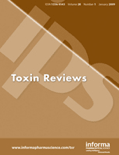
Toxin Reviews
Connecting Researchers to Practical ApplicationsToxin Reviews is a premier academic journal focused on the critical field of Toxicology, published by Taylor & Francis Inc. Established with an aim to foster research and disseminate knowledge, this journal has been pivotal since its inception in 1982 and continues to be a leading platform for both emerging and established researchers. With an impressive impact factor and ranked in the 75th percentile among its peers in the Scopus categories, it serves as an essential resource for scientists, practitioners, and students interested in understanding the complexities of toxins and their effects on health. The journal provides an Open Access platform, enhancing visibility and accessibility of research findings to a broader audience. Covering a wide scope, Toxin Reviews plays a vital role in bridging gaps between toxicological research and practical applications, ensuring that rigorous scientific inquiry translates into real-world solutions.

Toxicological Research
Fostering dialogue on the implications of toxins in our environment.Toxicological Research is a prominent academic journal dedicated to advancing the field of toxicology through rigorous exploration and innovative research. Published by the Korean Society of Toxicology, this journal serves as a vital resource for researchers, professionals, and students engaged in environmental science, pharmacology, and toxicology. With an ISSN of 1976-8257 and an E-ISSN of 2234-2753, Toxicological Research highlights significant findings and discussions in the realm of health, toxicology, and mutagenesis. Although not an open-access journal, it maintains a solid reputation as evidenced by its Q3 ranking in both health-related toxicology and general toxicology categories for 2023. The journal covers a broad spectrum of topics from fundamental research to applied toxicology and provides a unique platform for the dissemination of knowledge in a field that is increasingly relevant in today’s society. With an anticipated convergence period from 2008 to 2024, Toxicological Research continues to contribute vital insights to understanding the implications of toxic substances on health and the environment.

Toxicology and Environmental Health Sciences
Bridging Research and Practice in Environmental Health SciencesToxicology and Environmental Health Sciences is a peer-reviewed journal published by the Korean Society for Environmental Risk Assessment & Health Science, dedicated to advancing the fields of toxicology and environmental health. With an ISSN of 2005-9752 and E-ISSN 2233-7784, this journal serves as a vital platform for researchers, professionals, and students seeking to explore the intricate relationships between environmental risks and public health. Operating from South Korea, it has a converged years span from 2009 to 2024, and currently holds a respectable Q3 quartile ranking in both Health, Toxicology and Mutagenesis and Toxicology. This positions the journal within a critical space for those invested in understanding and mitigating environmental health challenges. Although not an open-access journal, it continues to foster high-impact research, contributing to a better understanding of toxicological sciences and environmental health dynamics. Engage with the latest findings and discussions that shape this evolving field through the insightful articles published herein, reinforcing its importance as a resource for scholars and practitioners alike.
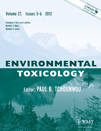
ENVIRONMENTAL TOXICOLOGY
Shaping Policies Through Cutting-Edge Toxicology ResearchENVIRONMENTAL TOXICOLOGY, published by Wiley, is a premier academic journal dedicated to the multifaceted study of toxic substances in the environment and their effects on human health and ecosystems. With the ISSN 1520-4081 and E-ISSN 1522-7278, this journal holds a prestigious position in the field, being ranked in the Q1 category across various relevant disciplines, including Health, Toxicology and Mutagenesis, and Management, Monitoring, Policy and Law. The journal regularly publishes high-quality research articles, reviews, and policy discussions aimed at understanding the implications of environmental toxins from 1980 to the present, contributing to the body of knowledge critical for the safety and sustainability of our environment. Researchers and professionals will find a treasure trove of information that not only highlights current trends and methodologies but also sets the stage for future advancements in toxicology. As a key resource, it provides valuable insights necessary for policy-making, environmental management, and public health, reinforcing its significance in the ever-evolving fields of toxicology and environmental science.
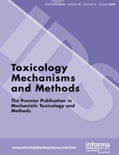
TOXICOLOGY MECHANISMS AND METHODS
Empowering researchers with cutting-edge toxicology studies.TOXICOLOGY MECHANISMS AND METHODS is a distinguished peer-reviewed journal dedicated to the advancement of toxicological research, published by Taylor & Francis Ltd. With its ISSN 1537-6516 and E-ISSN 1537-6524, this esteemed journal features critical studies and innovative methodologies in the field of toxicology, aligning with its mission to enhance understanding of biological mechanisms and risk assessment. The journal holds a commendable Q2 ranking in both the Health, Toxicology and Mutagenesis, and Toxicology categories, as well as strong positions in Scopus rankings, reflecting its influence with a 71st percentile rank in Toxicology and a 69th percentile rank in Environmental Health. Researchers, professionals, and students in the toxicology domain will find this journal to be an invaluable resource, offering open access options that foster widespread dissemination of its findings. Since its inception, encompassing converged years from 1991 to 1995 and from 2002 to 2024, the journal remains at the forefront of critical discourse and innovative research methods, making it a vital platform for advancing toxicological science globally.
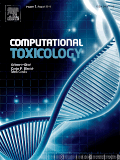
Computational Toxicology
Empowering insights at the intersection of toxicology and technology.Computational Toxicology is a premier journal published by Elsevier, dedicated to advancing the field of computational approaches in toxicological research. With an ISSN of 2468-1113, this journal provides a platform for researchers and professionals to share their innovative studies and methodologies from 2017 through 2024, promoting insightful discourse in essential areas such as computer science applications and toxicology. Recognized for its rigor and impact, it currently holds a Q2 ranking across various categories, including Computer Science Applications, Health, Toxicology and Mutagenesis, and Toxicology, highlighting its significance in the academic community. The journal is indexed in Scopus, boasting notable ranks including #284/817 in Computer Science Applications and #58/148 in Health, Toxicology and Mutagenesis, demonstrating its vital contribution to addressing contemporary challenges in environmental health and pharmacology. While it is not an open access journal, Computational Toxicology offers valuable insights for students, researchers, and practitioners striving to leverage computational frameworks to enhance the safety and efficacy of substances in human health and the environment.

BULLETIN OF ENVIRONMENTAL CONTAMINATION AND TOXICOLOGY
Investigating the effects of pollutants on human health.BULLETIN OF ENVIRONMENTAL CONTAMINATION AND TOXICOLOGY, published by SPRINGER, is a pivotal journal in the fields of Environmental Science, Toxicology, and Public Health. With a strong history of dissemination since its inception in 1966, the journal predominantly focuses on the latest advances in understanding environmental contaminants and their toxicological effects on health and ecosystems. It currently holds a respectable Q2 ranking across multiple categories including Health, Toxicology and Mutagenesis, Medicine (miscellaneous), and Pollution, as per the 2023 metrics. While the journal is not Open Access, it provides an invaluable platform for researchers, professionals, and students seeking to contribute to and stay informed on critical issues regarding environmental hazards and their implications. With an engaged community of scholars and practitioners, this journal continues to be an essential resource for addressing the pressing challenges of environmental contamination and its health impacts, guiding future research and policy decisions.
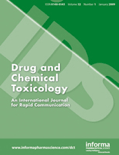
DRUG AND CHEMICAL TOXICOLOGY
Bridging disciplines for safer environments.Drug and Chemical Toxicology is a well-respected journal in the fields of toxicology, pharmacology, and public health, published by Taylor & Francis Ltd. Since its inception in 1978, this journal has diligently explored the effects and mechanisms of chemical exposures on health and the environment, fulfilling a crucial role in advancing scientific understanding and safeguarding public health. The journal is indexed across prestigious databases and features an impressive array of articles categorized within the Q2 and Q3 quartiles across various categories in 2023, reflecting its significance in Chemical Health and Safety as well as Environmental and Occupational Health disciplines. With an extensive reach and a focus on interdisciplinary research, Drug and Chemical Toxicology offers a rich repository of original research, reviews, and methodological advancements, catering to a diverse audience of researchers, professionals, and students dedicated to the betterment of safety and health standards. Although not an open-access publication, its articles are widely accessible to the academic community, ensuring that critical innovations and insights are shared for the greater good.
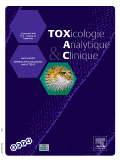
Toxicologie Analytique et Clinique
Advancing the Science of Toxicology and Clinical AnalysisToxicologie Analytique et Clinique is a distinguished journal published by ELSEVIER MASSON SAS EDITEUR, specializing in the ever-evolving fields of toxicology and clinical analysis. With its ISSN number 2352-0078 and E-ISSN 2352-0086, this journal has been contributing to the scientific dialogue since its inception in 2014, with a converged publication timeline extending to 2024. Despite its current standing in the Q4 category for both Health, Toxicology and Mutagenesis, and Toxicology in the 2023 metrics, as indicated by its rankings on Scopus, Toxicologie Analytique et Clinique remains a crucial platform for disseminating vital research within these domains. The journal's focus on analytical and clinical toxicology makes it an invaluable resource for researchers, practitioners, and students, seeking to enhance their understanding and methodologies in toxicological studies. As a vital contributor to the academic landscape, Toxicologie Analytique et Clinique aims to provide a rich repository of knowledge that promotes innovation and safety in clinical practices and environmental science.